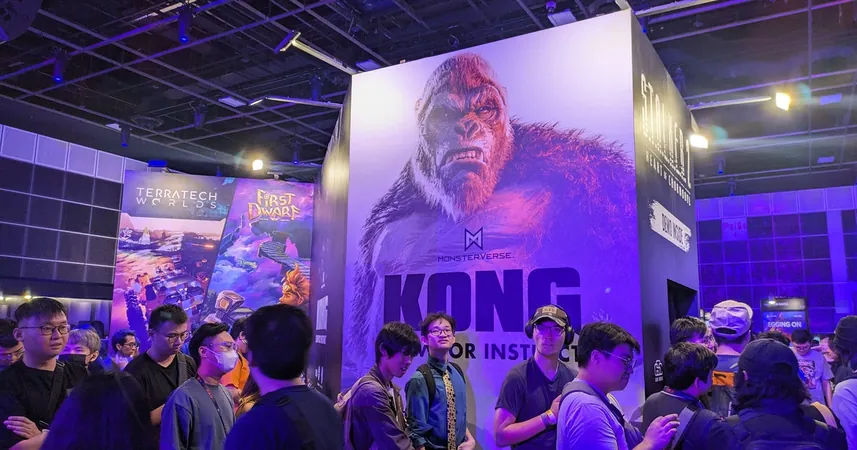
GCL's Bold Ambitions: Bridging Asian Gaming Culture to the World Stage
2024-11-28
Author: Jacob
While the name GCL may not yet resonate in the West, this powerhouse of digital entertainment stands tall as one of Asia's largest gaming companies. Specializing in publishing renowned titles such as Black Myth: Wukong, Stalker 2, and Atomic Heart, GCL has also established itself as a major distributor for gaming giants like Take-Two, CD Projekt Red, Sega, and Warner Bros.
A Multifaceted Business Model
Keith Liu, the chief marketing officer and head of publishing, shed light on GCL's operations during a recent discussion at Gamescom Asia. "GCL comprises six brands that collectively cover the entire spectrum of gaming in Asia," he explains. With a comprehensive portfolio that extends from publishing and distribution to influencer marketing and digital retail through their brand 2Game, GCL operates out of Singapore, with branches in Hong Kong, Taiwan, and China. The firm is also forging robust connections in gaming hubs Japan and Korea.
The publishing arm, known as 4Divinity, frequently steps in as a co-publisher for AAA titles across various Asian territories. Liu highlights successful collaborations for the Southeast Asian regions with notable titles, including Stalker 2 and JDM: Japanese Drift Master, demonstrating GCL's ability to navigate the fragmented Asian gaming market.
Navigating Cultural Complexity
The Asian gaming landscape is known for its diversity, with unique preferences and cultural nuances varying significantly between countries. "With different languages and varying gamer interests, the region poses challenges for Western developers. Many find they must work with multiple partners to break into these diverse markets," Liu notes. GCL's strength lies in its ability to provide a localized approach, facilitating smoother entries for Western titles into the Asian market while also eyeing opportunities to bring Asian-developed games to an international audience.
GCL began its journey with a distribution network called Epicsoft Asia, which debuted with Grand Theft Auto IV and has maintained valuable partnerships with Take-Two, distributing various titles, including the beloved Red Dead Redemption series and recent hits like Cyberpunk 2077.
Towards Game Development and IPO Aspirations
Looking onward, GCL has announced its ambition to go public via a De-SPAC route on Nasdaq, aiming to secure funding for future game development. "We want to create impactful and memorable IPs," Liu emphasizes. GCL is poised not only to continue its publishing efforts but also to branch into creating its own games, inspired heavily by the monumental success of titles like Black Myth: Wukong, which beautifully intertwines Asian cultural elements with global gaming appeal.
As Liu puts it, "Our goal isn’t merely to produce games; we want to tell stories that resonate. The gaming industry has been kind of battered lately, but there's still a hunger for engaging content. Our mission is straightforward: make games that are fun."
Adapting to Market Dynamics
The Southeast Asian market remains dynamic, with digital sales increasingly overtaking physical copies, especially in countries like China—where PC overwhelmingly dominates the gaming environment. In contrast, the console market has its unique challenges, given the historical reasons that hampered its penetration in China. GCL explains the importance of physical titles in regions where the secondary market thrives, allowing gamers to trade and share experiences effectively.
"Consoles have not really taken off in China, but they’re strong in Japan and Taiwan," Liu notes, backing this with data showcasing that physical sales still account for a significant share of the market, especially for new releases. The cultural factors and consumer behavior in these regions create a balanced ecosystem where both digital and physical formats exist hand in hand, allowing players the flexibility they desire.
The Future of Gaming is Bright
GCL's multifaceted approach positions it to be a key player as the gaming landscape continues to evolve. By understanding local markets and cultural contexts, the company aims not only to elevate Asian IPs but also to redefine global gaming narratives. Given its ambitious plans and deep-rooted industry connections, GCL is set to make waves in the gaming world—an exciting prospect for fans and developers alike.









 Brasil (PT)
Brasil (PT)
 Canada (EN)
Canada (EN)
 Chile (ES)
Chile (ES)
 España (ES)
España (ES)
 France (FR)
France (FR)
 Hong Kong (EN)
Hong Kong (EN)
 Italia (IT)
Italia (IT)
 日本 (JA)
日本 (JA)
 Magyarország (HU)
Magyarország (HU)
 Norge (NO)
Norge (NO)
 Polska (PL)
Polska (PL)
 Schweiz (DE)
Schweiz (DE)
 Singapore (EN)
Singapore (EN)
 Sverige (SV)
Sverige (SV)
 Suomi (FI)
Suomi (FI)
 Türkiye (TR)
Türkiye (TR)